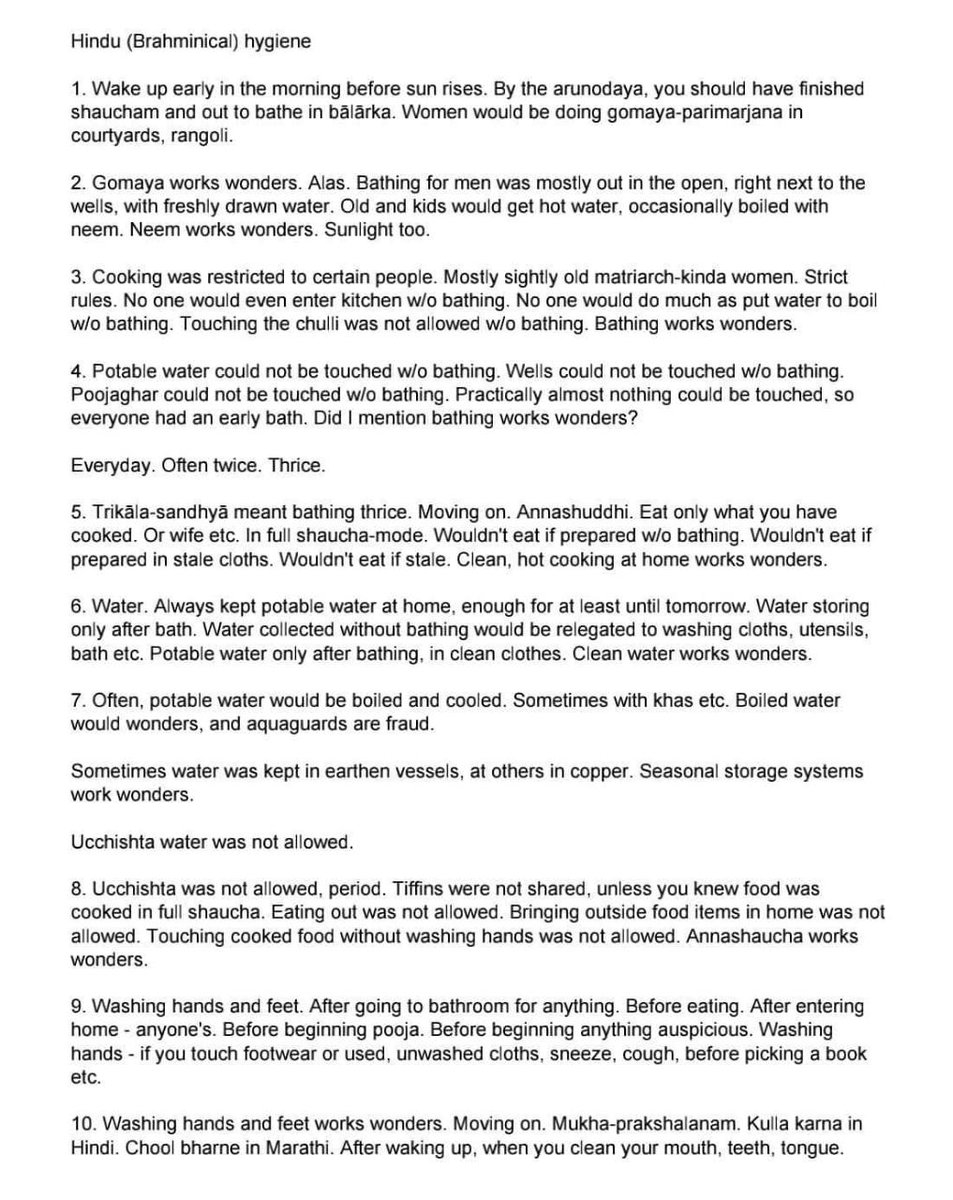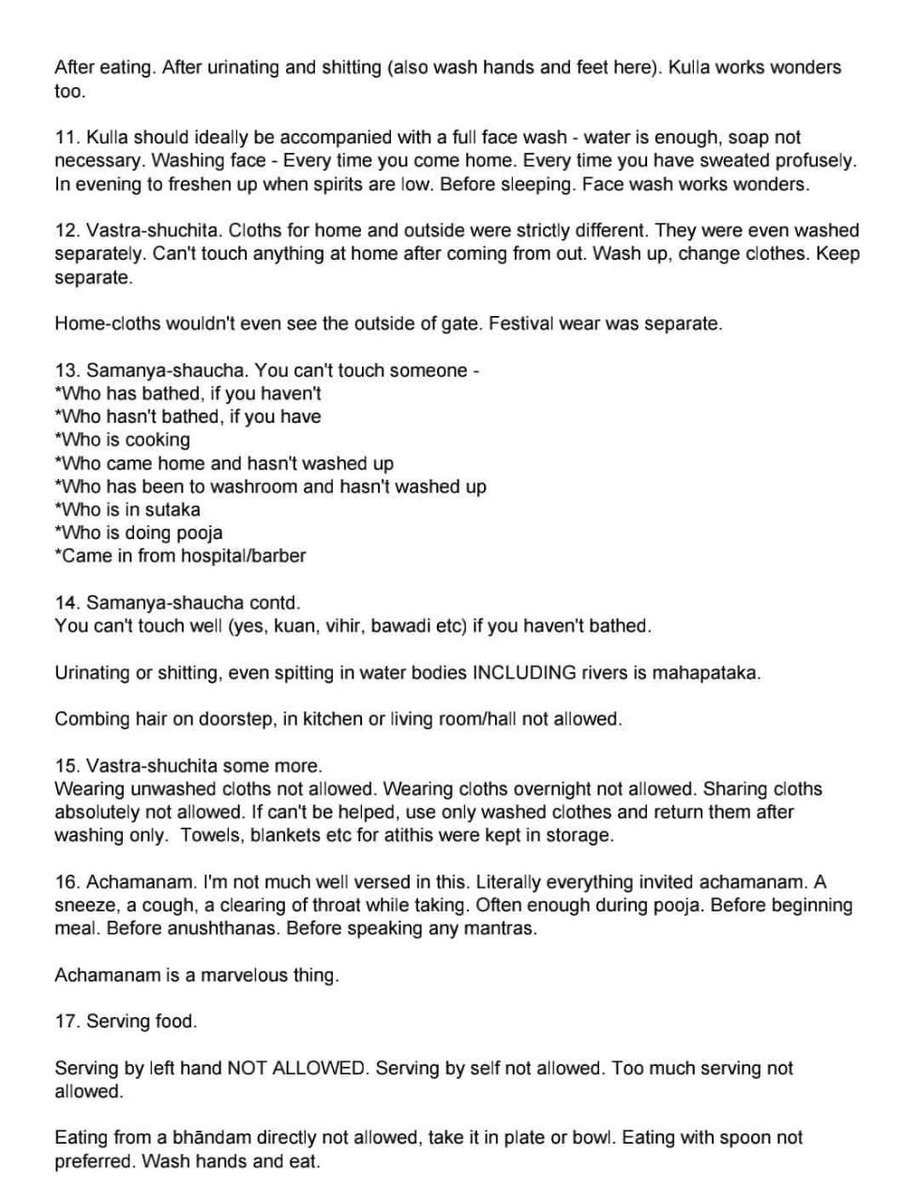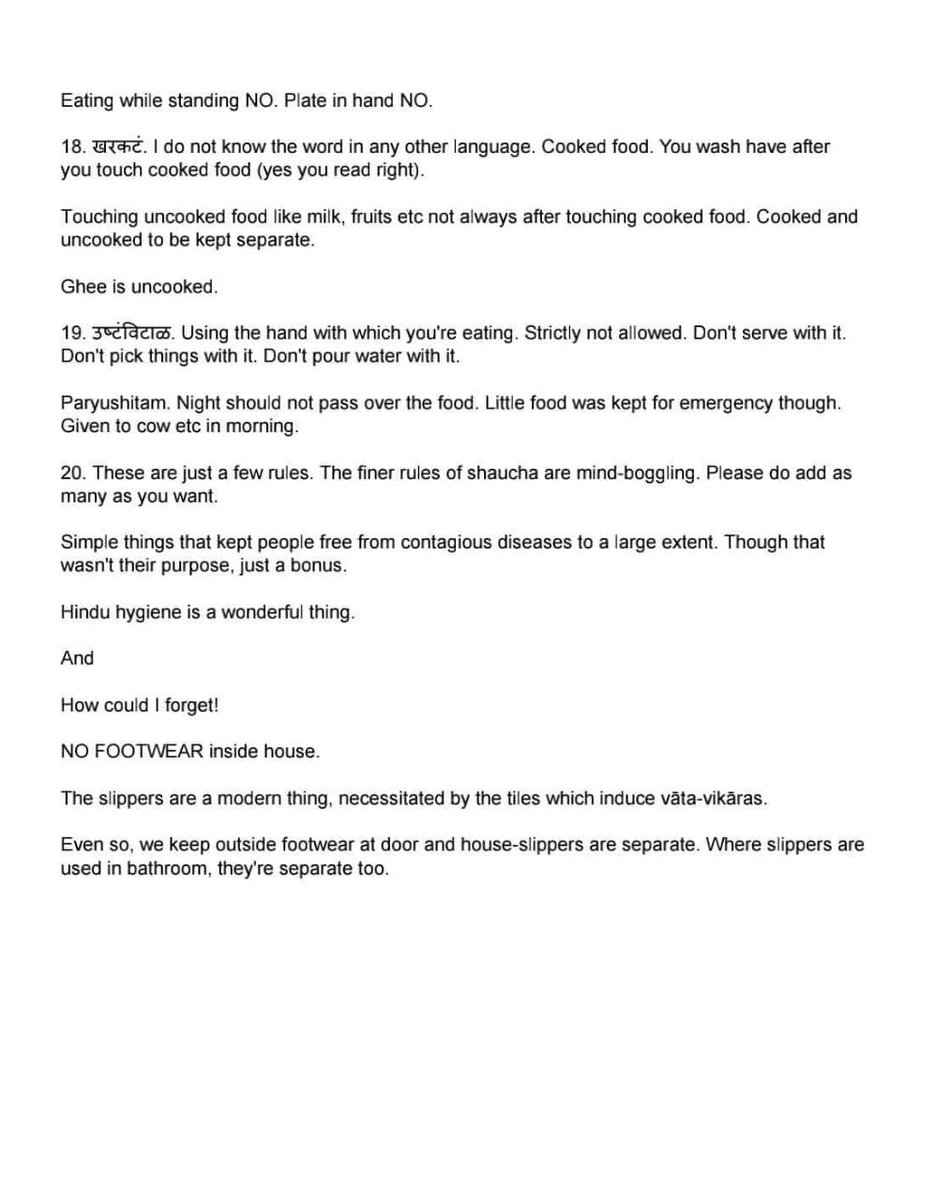Thread on Hindu (Brahminical) hygiene coming up.
Please mute in advance. Thanks.
1. Wake up early in the morning before sun rises. By the arunodaya, you should have finished shaucham and out to bathe in bālārka. Women would be doing gomaya-parimarjana in courtyards, rangoli.
Please mute in advance. Thanks.
1. Wake up early in the morning before sun rises. By the arunodaya, you should have finished shaucham and out to bathe in bālārka. Women would be doing gomaya-parimarjana in courtyards, rangoli.
2. Gomaya works wonders. Alas. Bathing for men was mostly out in the open, right next to the wells, with freshly drawn water. Old and kids would get hot water, occasionally boiled with neem. Neem works wonders. Sunlight too.
3. Cooking was restricted to certain people. Mostly sightly old matriarch-kinda women. Strict rules. No one would even enter kitchen w/o bathing. No one would do much as put water to boil w/o bathing. Touching the chulli was not allowed w/o bathing. Bathing works wonders.
4. Potable water could not be touched w/o bathing. Wells could not be touched w/o bathing. Poojaghar could not be touched w/o bathing. Practically almost nothing could be touched, so everyone had an early bath. Did I mention bathing works wonders?
Everyday. Often twice. Thrice.
Everyday. Often twice. Thrice.
5. Trikāla-sandhyā meant bathing thrice. Moving on. Annashuddhi. Eat only what you have cooked. Or wife etc. In full shaucha-mode. Wouldn& #39;t eat if prepared w/o bathing. Wouldn& #39;t eat if prepared in stale cloths. Wouldn& #39;t eat if stale. Clean, hot cooking at home works wonders.
6. Water. Always kept potable water at home, enough for at least until tomorrow. Water storing only after bath. Water collected without bathing would be relegated to washing cloths, utensils, bath etc. Potable water only after bathing, in clean clothes. Clean water works wonders.
7. Often, potable water would be boiled and cooled. Sometimes with khas etc. Boiled water would wonders, and aquaguards are fraud.
Sometimes water was kept in earthen vessels, at others in copper. Seasonal storage systems work wonders.
Ucchishta water was not allowed.
Sometimes water was kept in earthen vessels, at others in copper. Seasonal storage systems work wonders.
Ucchishta water was not allowed.
8. Ucchishta was not allowed, period. Tiffins were not shared, unless you knew food was cooked in full shaucha. Eating out was not allowed. Bringing outside food items in home was not allowed. Touching cooked food without washing hands was not allowed. Annashaucha works wonders.
9. Washing hands and feet. After going to bathroom for anything. Before eating. After entering home - anyone& #39;s. Before beginning pooja. Before beginning anything auspicious. Washing hands - if you touch footwear or used, unwashed cloths, sneeze, cough, before picking a book etc.
10. Washing hands and feet works wonders. Moving on. Mukha-prakshalanam. Kulla karna in Hindi. Chool bharne in Marathi. After waking up, when you clean your mouth, teeth, tongue. After eating. After urinating and shitting (also wash hands and feet here). Kulla works wonders too.
11. Kulla should ideally be accompanied with a full face wash - water is enough, soap not necessary. Washing face - Every time you come home. Every time you have sweated profusely. In evening to freshen up when spirits are low. Before sleeping. Face wash works wonders.
12. Vastra-shuchita. Cloths for home and outside were strictly different. They were even washed separately. Can& #39;t touch anything at home after coming from out. Wash up, change clothes. Keep separate.
Home-cloths wouldn& #39;t even see the outside of gate. Festival wear was separate.
Home-cloths wouldn& #39;t even see the outside of gate. Festival wear was separate.
13. Samanya-shaucha. You can& #39;t touch someone -
*Who has bathed, if you haven& #39;t
*Who hasn& #39;t bathed, if you have
*Who is cooking
*Who came home and hasn& #39;t washed up
*Who has been to washroom and hasn& #39;t washed up
*Who is in sutaka
*Who is doing pooja
*Came in from hospital/barber
*Who has bathed, if you haven& #39;t
*Who hasn& #39;t bathed, if you have
*Who is cooking
*Who came home and hasn& #39;t washed up
*Who has been to washroom and hasn& #39;t washed up
*Who is in sutaka
*Who is doing pooja
*Came in from hospital/barber
14. Samanya-shaucha contd.
You can& #39;t touch well (yes, kuan, vihir, bawadi etc) if you haven& #39;t bathed.
Urinating or shitting, even spitting in water bodies INCLUDING rivers is mahapataka.
Combing hair on doorstep, in kitchen or living room/hall not allowed.
You can& #39;t touch well (yes, kuan, vihir, bawadi etc) if you haven& #39;t bathed.
Urinating or shitting, even spitting in water bodies INCLUDING rivers is mahapataka.
Combing hair on doorstep, in kitchen or living room/hall not allowed.
15. Vastra-shuchita some more.
Wearing unwashed cloths not allowed. Wearing cloths overnight not allowed. Sharing cloths absolutely not allowed. If can& #39;t be helped, use only washed clothes and return them after washing only. Towels, blankets etc for atithis were kept in storage.
Wearing unwashed cloths not allowed. Wearing cloths overnight not allowed. Sharing cloths absolutely not allowed. If can& #39;t be helped, use only washed clothes and return them after washing only. Towels, blankets etc for atithis were kept in storage.
16. Achamanam. I& #39;m not much well versed in this. Literally everything invited achamanam. A sneeze, a cough, a clearing of throat while taking. Often enough during pooja. Before beginning meal. Before anushthanas. Before speaking any mantras.
Achamanam is a marvelous thing.
Achamanam is a marvelous thing.
17. Serving food.
Serving by left hand NOT ALLOWED. Serving by self not allowed. Too much serving not allowed.
Eating from a bhāndam directly not allowed, take it in plate or bowl. Eating with spoon not preferred. Wash hands and eat.
Eating while standing NO. Plate in hand NO.
Serving by left hand NOT ALLOWED. Serving by self not allowed. Too much serving not allowed.
Eating from a bhāndam directly not allowed, take it in plate or bowl. Eating with spoon not preferred. Wash hands and eat.
Eating while standing NO. Plate in hand NO.
18. खरकटं. I do not know the word in any other language. Cooked food. You wash have after you touch cooked food (yes you read right).
Touching uncooked food like milk, fruits etc not always after touching cooked food. Cooked and uncooked to be kept separate.
Ghee is uncooked.
Touching uncooked food like milk, fruits etc not always after touching cooked food. Cooked and uncooked to be kept separate.
Ghee is uncooked.
19. उष्टंविटाळ. Using the hand with which you& #39;re eating. Strictly not allowed. Don& #39;t serve with it. Don& #39;t pick things with it. Don& #39;t pour water with it.
Paryushitam. Night should not pass over the food. Little food was kept for emergency though. Given to cow etc in morning.
Paryushitam. Night should not pass over the food. Little food was kept for emergency though. Given to cow etc in morning.
20. These are just a few rules. The finer rules of shaucha are mind-boggling. Please do add as many as you want.
Simple things that kept people free from contagious diseases to a large extent. Though that wasn& #39;t their purpose, just a bonus.
Hindu hygiene is a wonderful thing.
Simple things that kept people free from contagious diseases to a large extent. Though that wasn& #39;t their purpose, just a bonus.
Hindu hygiene is a wonderful thing.
End.
How could I forget!
NO FOOTWEAR inside house.
The slippers are a modern thing, necessitated by the tiles which induce vāta-vikāras.
Even so, we keep outside footwear at door and house-slippers are separate. Where slippers are used in bathroom, they& #39;re separate too.
NO FOOTWEAR inside house.
The slippers are a modern thing, necessitated by the tiles which induce vāta-vikāras.
Even so, we keep outside footwear at door and house-slippers are separate. Where slippers are used in bathroom, they& #39;re separate too.
Shri @The_A_square has kindly compiled this thread into picture format. Many thanks to him.

 Read on Twitter
Read on Twitter




